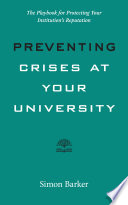

Most ebook files are in PDF format, so you can easily read them using various software such as Foxit Reader or directly on the Google Chrome browser.
Some ebook files are released by publishers in other formats such as .awz, .mobi, .epub, .fb2, etc. You may need to install specific software to read these formats on mobile/PC, such as Calibre.
Please read the tutorial at this link: https://ebookbell.com/faq
We offer FREE conversion to the popular formats you request; however, this may take some time. Therefore, right after payment, please email us, and we will try to provide the service as quickly as possible.
For some exceptional file formats or broken links (if any), please refrain from opening any disputes. Instead, email us first, and we will try to assist within a maximum of 6 hours.
EbookBell Team

0.0
0 reviewsA new playbook for effective crisis management in higher education.
Unlike other industries, in higher education an institution's most important asset is its reputation. Yet as fundamental as it is, many leaders continue to view managing reputation as dishonest and counterproductive, a suspect process that undermines the very idea of reputation as an organic outcome of reality. When leadership credibility is on the line, though, and an institution's reputation is facing potentially irreparable damage, the concept of reputational risk moves from being nebulous to all too tangible.
In Preventing Crises at Your University, Simon Barker demonstrates how critical it is for colleges and universities to align strategy and values with decision-making during times of crisis. Arguing that leaders must stop considering the discussion of reputational risk as unseemly, he demonstrates that this discussion is in fact a strategic imperative for every leader. Significant reputational damage, Barker asserts, is not the inevitable outcome of a crisis but of a poor response. Defining a new crisis leadership playbook to deal with self-inflicted crises, he also
• explains what typically goes wrong in a crisis;
• describes how to prevent crises from escalating;
• demonstrates how a stakeholder-centric model of communications can help mitigate reputational damage; and
• introduces a number of original concepts, including a Reputational Risk Management Framework, a Reputational Risk Maturity Model, and a Culture and Capability matrix.
Moving beyond the theoretical by presenting case studies of real crises involving sexual assault, freedom of speech, student protests, faculty misconduct, and a broad range of financial, social, and ethical issues, the book highlights and underscore key concepts around effective management of reputational risk. Ultimately, Preventing Crises at Your University serves as a wake-up call for all higher education leaders and board members